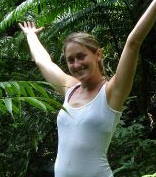-

- 951 NW 13th St.3E Boca Raton, FL 33486 (561) 864-0298 info@bicolclinic.org
-

-


Volunteer: Katheriene Fyall
Bicol Clinic Foundation, Inc.
Philippines, 2008
I feel very fortunate to have had the opportunity to work with the Bicol Foundation at the clinic in Buena Vista, Sorsogon. The majority of our time was spent in the clinic with patients; however, we were also able to travel to local hospitals and centers for infectious disease control. During this experience, I personally learned a great deal about tropical medicine and third-world healthcare. The trip also reminded me of the reasons I decided to pursue medicine, and I feel inspired to continue humanitarian efforts throughout my education and career as a physician.
When we arrived in the Bicol region, I was very surprised by the reception we received. Unlike other places I have travelled to, the people where overwhelmingly friendly and kind. We were greeted with smiles and waves and genuine courtesy. Many people lived in what we might consider poverty in the United States; the majority of houses had thatched roofs and the walls were often assortments of miscellaneous planks and bamboo. Cold springs were utilized for bathing and washing clothes. An aspect of the lifestyle that struck me in particular was that the young children played freely in the streets. It seemed to be in such stark contrast to the childhood experienced back home. I felt a certain sadness when I considered the video games and TV babysitters that we employ in the states. I won't forget what one elderly woman said at the clinic. She said, "We are very poor, but we are very happy."
I was beginning to feel as though we have it all wrong here in the US. I almost felt a longing for the lifestyle that I perceived as simpler and more peaceful. However, when we started working, I realized the naivety of my feelings. We saw patients suffering from conditions that are either not seen or are mere nuisances in the states. We saw young children with tuberculosis, congenital malformations and cancer. The majority of cases were completely treatable given the right medication or facility for care. And although we cannot fix everything in the United States, seeing a person, especially a child, suffer without palliative care is absolutely heartbreaking. One case I found especially distressing was a young boy's struggle with end stage renal disease. He and his family did not understand the etiology of his condition, nor did they have sufficient funding for dialysis. His only chance for long-term survival would be a transplant; however, he would have to travel to Manila to be put on the list and his mother could not afford the trip. He had no advocate, little hope and he was barely in his teens.
I began to realize that I had a misunderstanding of the term "tropical medicine." My impression changed from diseases unique to a particular climate, to diseases restricted to regions of third world healthcare. It is easy to feel powerless to help in these conditions, but the Bicol Clinic is a start. I was very inspired by the dedication of the founders, and their passion for the humanitarian endeavor. I hope that our experiences there will help spread goodwill and encourage more support.
When we were not working in the clinic, we explored the city's hospitals and health clinics. I was shocked by the conditions we saw at the hospitals. I should have known what to expect when we saw re-used latex gloves line-drying in front of a main entrance. The rooms were set up as wards, with many beds lining the walls. Gurneys were rusted and equipment was decrepit if even available. I found it quite terrifying to imagine entering as a patient. It must be insanely frustrating to be a physician at such a location where one has an understanding of how treat an illness without the means to do so.
I found a more encouraging environment at one of the local infectious disease clinics. I met a wonderful physician who was largely responsible for the development of the clinic. He was successful in meeting government requirements to receive TB medications through the DOTS program. His passion and dedication to the community and the eradication of disease was inspirational. The clinic treated many conditions, but the focus was on diagnosing and treating tuberculosis. The largest obstacle was the lack of an x-ray machine. Potential TB patients were required to pay for their own chest x-ray at the local hospital and, although the treatment is free of charge, this diagnostic expense proves enough to deter many people. I hope to fund-raise here in the United States with the goal of purchasing a mobile chest x-ray unit for the Sorsogon province.
In addition to the emotional and social experience, I also had a great deal of exposure to clinical medicine on this trip. I learned valuable history-taking skills and saw physical exam findings that were quite remarkable. I hope it is clear from my short essay that our trip to the Philippines was truly an invaluable experience for me as a person and as a medical student. I am very grateful to all of those supporters who make it possible for students like me to gain a better understanding of the culture and world outside of the lecture hall.
Thank you very much, Katherine Fyall
University of Miami
Medical Student
Want To Join Our Team?
BCF has dispatched more than 150 medical students, in addition to dozens of American and foreign physicians and nurses, to provide care to more than 75,000 patients in the Philippines, Nepal and Haiti, many of whom had never before seen a physician. Our team members also volunteer in orphanages and schools to extend health care to other aspects of life. We’d love for you to be Part of the Start!
Join Our TeamThe application and all additional requirements MUST BE SUBMITTED BY January 21 , 2020.
